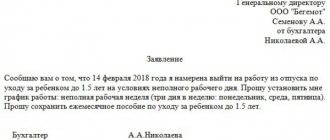Home / Labor Law / Dismissal and layoffs / Retrenchment
Back
Published: 01/12/2018
Reading time: 6 min
0
4278
The norms of the current labor legislation provide for a woman’s right to paid leave, which includes the last months of pregnancy and the first one and a half or three years of the child’s life.
Such leave is commonly referred to as maternity leave. Meanwhile, the Labor Code of the Russian Federation does not contain the concept of “maternity leave”; instead, the concept of “maternity leave” appears. The procedure for granting such leave is regulated by Article 255 of the Labor Code. Article 256 of the same document provides for the young mother to retain her job throughout the entire vacation period.
But this does not mean that a woman who has gone on maternity leave is completely insured against losing her position . Let's figure out in what cases a maternity leaver may lose her job.
- Under the protection of the law
- Liquidation of an enterprise and an employee on maternity leave
- What payments can you expect?
- Dismissal after maternity leave: are payments due?
Dear readers! To solve your problem, call hotline 8 or ask a question on the website. It's free.
Ask a Question
Dismissal due to reduction from maternity leave
It is permissible to dismiss a woman due to the expiration of an employment contract during her pregnancy, if the employment contract was concluded for the duration of the duties of an absent employee and it is impossible, with the written consent of the woman, to transfer her to another job available to the employer before the end of her pregnancy (as a vacant position or a job corresponding to the woman’s qualifications, and a vacant lower position or lower paid job) that a woman can perform taking into account her state of health. In this case, the employer is obliged to offer her all the vacancies that he has in the given area that meet the specified requirements. The employer is obliged to offer vacancies in other localities if this is provided for by the collective agreement, agreements, or employment contract.
Under the protection of the law
Article 261 protects a woman on maternity leave from dismissal at the initiative of the employer.
Even if the position in which she worked before going on maternity leave is reduced, mommy should retain her place on the organization’s staff. In this case, the employer is obliged to offer the maternity leaver a transfer to another position with a salary not lower than the previous one. Unfortunately, there are often cases when, already at the end of maternity leave, a woman finds out that she has nowhere to go - her position has been reduced.
In this situation, there is a violation of labor laws by the employer. Article 5.27 of the Code of Administrative Offenses of the Russian Federation provides for administrative liability in the form of a fine or suspension of the activities of a legal entity. An employer has the right to say goodbye to an employee on maternity leave only with the latter’s consent.
When reorganizing an enterprise, implemented in various forms (merger, division, transformation, subordination, affiliation with another organization), there are also no legal grounds for dismissing employees on maternity leave. If during the reorganization the position of such an employee is abolished, the law obliges the employer to keep her on staff by transferring her to another position.
We suggest you read: How many days of annual leave are required before maternity leave?
At the same time, the salary for the new position of maternity leave must not be lower than the salary for the abolished one.
Payments upon reduction after maternity leave
2. If leave is granted, after the leave I will sign a notice of layoff. What should I do in the next two months? My department does not exist; all functions have been transferred to another organization. In my organization, only work with clients remained, and I worked in the accounting department. The proposed vacancies will not suit me. Can I resign early? And what payments are not due then? Does the employer have the right to force me to work these 2 months at another job, my job is no longer there, or I may not agree to the proposed options and then there will be an early layoff?
Liquidation of an enterprise and an employee on maternity leave
There is only one option for laying off women during pregnancy and until the child is one and a half years old without violating labor laws.
We are talking about the termination of the economic activities of an individual entrepreneur or the liquidation of an enterprise that employs a maternity leaver. In this case, employees on maternity leave are dismissed on a general basis.
We invite you to read: Violation of traffic rules resulting in an accident
Only a written notice signed by the recipient is considered as a notification document, i.e. maternity leavers. Notification of dismissal by telephone or in any other way without written notice is considered unlawful.
The absence of notice of dismissal is sufficient justification for a claim if a woman decides to sue her former employer.
Is it possible to lay off an employee on maternity leave{q}
Maternity leave should be understood as the period of sick leave that is given to a woman before childbirth and rehabilitation after childbirth. If you are pregnant with one child and there are no postpartum complications, this period is 140 days. After sick leave, a maternity leave is entitled to leave until the child is 3 years old, who is often mistakenly classified as maternity leave.
We invite you to read: Can an employer refuse vacation: educational or summer?
| Regulations of the Labor Code of the Russian Federation | Art. Labor Code of the Russian Federation |
| General rule prohibiting dismissal during vacation | part 6 art. 81 |
| It is impossible to fire a pregnant woman | Part 1 Art. 261 |
| Possibility of dismissal of a pregnant woman | Clause 1 Part 1 Art. 81 |
| Link to possible grounds for dismissal of an employee before the child’s 3rd birthday | Part 4 Art. 261 |
| Guarantees for laid-off employees | Part 1 Art. 178 |
| Possibility, with the consent of the employee, of terminating the contract before the effective date of the notice of layoff | Part 3 Art. 180 |
In the event of bankruptcy of an organization, which may result in the dismissal of all employees (in the event of its liquidation) or a reduction in the number of personnel during bankruptcy proceedings, the conditions for the payment of severance pay and their priority are determined by Federal Law No. 127 of October 26, 2002.
Information
Social insurance issues related to maternity are regulated by Federal Law No. 255 of December 26, 2006 (clause 2, part 1, article 1.4, article 13).
A woman has a guaranteed right to maternity leave, which she can go on at the end of the 30th week in pregnancy. The date from which the start of pregnancy is counted is determined by the gynecologist of the clinic at the place where the pregnant woman is registered.
The position of most employers regarding maternity leave is based on the desire to redistribute her responsibilities among other employees. In such a situation, a hidden precondition is subsequently created for the reduction of the maternity leave position.
The Labor Code of the Russian Federation (Article 256) reserves a woman’s right, at the end of sick leave or a period of child care, to return not only to her organization, but also to her previous workplace, beginning to perform the duties previously specified in the employment agreement.
Attention
The law interprets unambiguously that a maternity leaver cannot be fired due to reduction. The employer is deprived of initiative in such dismissal. But a pregnant woman, maternity leave or mother, with a child under 3 years old, has the right to resign themselves - voluntarily and on the basis of their written application.
The law allows for the dismissal of a maternity leaver with the liquidation of the organization. But measures related to the liquidation of an enterprise cannot be identified with measures designated as reduction.
The legislation does not allow an initiative and unilateral change by the head of the organization's staffing table that affects the interests of an employee who is on maternity leave and who is raising a child under 3 years of age.
Attention
The only possible option in this situation may be an agreement reached with the employee to transfer her to another vacant position.
If such consent is obtained, the translation must be documented. The following algorithm is possible:
- At the request of the employee, formalize her early exit from vacation (you can even do it for 1 day).
- Upon exit, with the written consent of the woman, issue an order for her transfer to another position.
Having completed the transfer, the employee is given the rest of the vacation, after which she returns to work in a new position.
Additionally
Read more about the possibility of reducing a maternity position.
here
.
The Labor Code of the Russian Federation not only does not give the employer the right to dismiss a woman on maternity leave, but also does not prescribe valid circumstances under which it is possible to reduce the position of an employee on maternity leave.
An employment agreement that expired during the maternity period is subject to automatic extension until the end of the vacation.
Attention
No organizational staffing measures taken are also grounds for laying off an employee working on maternity leave.
The legal basis for this is that with him, on the basis of Part 3 of Art. 79 of the Labor Code of the Russian Federation, a fixed-term contract was concluded for the period of absence of the main employee, and the possibility of dismissal due to a reduction in the number or staff of the main employee on maternity leave is not in the list of exceptions provided for in Art. 81 Labor Code of the Russian Federation.
When a woman goes on maternity leave, her position remains with her. This is guaranteed by the Labor Code of the Russian Federation. The employer does not have the right to arbitrarily change her job responsibilities or position in the staffing table, regardless of whether the company is currently going through a problem period or not.
https://www.youtube.com/watch{q}v=hFr0Mrg9X88
An employee can return to work either upon completion of maternity leave or ahead of schedule. If a woman leaves her vacation early, she can start working:
- in full, if it is possible to leave the child under the care of loved ones;
- according to a part-time work schedule;
- in a remote form, if her duties provide for such a possibility.
Early termination of maternity leave does not mean that a woman is not covered by the legal guarantees provided for women on maternity leave. According to the law, employers cannot lay off a woman on maternity leave when reducing staff, as well as in the event of an early return of a young mother to work.
The only possibility to legally dismiss a maternity leaver during a staff reduction without her consent is to lay off all employees during the complete liquidation of the enterprise.
If the company does not plan to close, the employer has only two options:
- Organize dismissal at your own request. In some cases, women on maternity leave do not want to return to their old job and submit their resignation. There are also situations where management puts pressure on a young mother, forcing her to submit such an application. The second case is illegal, and the woman can seek protection from the prosecutor's office or the labor inspectorate. But not all those unfairly dismissed resort to this method, believing that even if they are reinstated, working with such management will not bring pleasure.
- Dismissal under the article due to violations of the law by a maternity leaver. Despite having a small child, some women may not be moral models.
We suggest you read: Vacation application - who should sign
Some offenses are legal grounds for dismissing an employee, even if she is a woman on maternity leave or a mother who has returned from maternity leave early. These include:
- There are grounds to believe that the employee does not have the skills necessary to perform the duties assigned to him.
- Repeated violations of company regulations regarding work hours: numerous tardiness and absenteeism.
- Theft of company property (but only after the employee is found guilty by the court).
- Appearing at work in an inadequate state, that is, under the influence of alcohol or drugs.
- Failure to comply with the conditions for maintaining trade secrets, resulting in damage to the enterprise.
- Immoral behavior (this argument is very often used among teachers).
In cases where the management is completely satisfied with the employee’s qualities and only a reduction in a specific salary is required, the maternity leaver may be offered a transfer to another position. The need for this often arises during a company reorganization. In this case, the woman will need to interrupt her vacation for one day and sign documents on the transition to a new rate. After this, she can return to vacation again (if desired).
After a maternity leaver is transferred to a new position, her old salary can be safely reduced, and this will not be a violation of the law.
When an employee goes on maternity leave, company management can either redistribute her responsibilities among other employees or hire temporary staff to replace the maternity leaver. As a rule, a fixed-term employment contract is concluded with such personnel, that is, an agreement that has a specific validity period. But an employee hired during the absence of the main employee can go on maternity leave.
The rules for dismissing temporary workers on maternity leave are slightly different from the guarantees provided to main employees:
- the expiration date of the employment contract for a temporary employee on maternity leave is not grounds for dismissal;
- the contract is extended until the end of parental leave, more precisely, until the day the child turns 3 years old;
- a temporary employee cannot leave maternity leave early if the main employee has already started working;
- the employment contract upon completion of 3 years of maternity leave is terminated due to the expiration of the contract term, that is, in fact, there is not a reduction, but the dismissal of the employee in accordance with the terms of the previously concluded agreement.
The Labor Code of the Russian Federation stipulates that while an employee is on maternity leave or child care leave, she retains her job and is paid benefits.
There are times when, while on maternity leave to care for one child, a woman learns about a new pregnancy. Then the employee is entitled to another maternity leave, but the Labor Code prohibits taking two leaves at the same time.
To get out of this situation, they usually interrupt maternity leave for the first child and replace it with labor and labor leave, after which the employee goes on another maternity leave, but this time for two children. To do this, the woman should write a corresponding statement.
The guarantees of job security in this case are the same as during the first pregnancy.
A woman who is on maternity leave, as well as to care for a child under three years old, cannot be laid off. Exceptions are dismissal at the request of the employee herself, if she agrees to leave of her own free will during layoffs, or dismissal due to the liquidation of the enterprise. These rights are guaranteed according to Art. 261 Labor Code of the Russian Federation. Let's consider how an employee of an organization who is on leave to care for a minor child can be legally laid off.
What are the consequences for the director of illegal actions?
If an employee on maternity leave was illegally dismissed, an appeal to higher authorities is required.
After dismissal, you are given only a month to appeal the manager’s decision.
When contacting labor authorities, document verification may be delayed and the deadline will be missed, so it is advisable to immediately go to court .
Supporting documents are prepared in duplicate, one of them is kept by the employee with a note of acceptance.
After the court confirms the illegality of dismissal, the employer will have several ways to resolve the conflict:
- re-registration of an entry in the work book for dismissal at one's own request.
- Reinstatement of an employee to his position if the employee wishes.
- Payment of compensation for moral damage and missed days. Cash is paid regardless of whether the employee decides to stay at work or finds a new one.
- If the employee has already found a new job, the date of dismissal may be changed in the work book. The entry is entered with the date preceding the day of employment for the new position.
Note! If an employee does not show up for work after the dismissal is declared illegal and reinstated, such absenteeism is called forced. The law does not limit its duration in any way - it can last a day, a week, a month or a year. According to the court ruling, the employee is paid the average salary throughout this period.
In cases where the dismissal caused physical or moral harm to the employee’s health, the court awards him compensation from the company.
What principles are used to guide the procedure?
An employer who has decided to reduce staff must notify the employment center 2 months in advance in accordance with clause 2 of the first part of Article 281 of the Labor Code of the Russian Federation.
The reduction algorithm is similar to the dismissal procedure:
- filing an application.
- Preparation of the order.
- Payments to employees and issuance of work books on the final working day.
The significant difference is that in case of layoffs, employees are personally notified 2 months in advance in writing. The employee signs the document.
Important! If there are 2 months left before the employee returns from maternity leave, the employer has the right to send her a warning about the upcoming dismissal, but only if the child will already be 3 years old by the time the mother is laid off.
On the first working day, the employee will be transferred to another position offered by the company. If a woman is not satisfied with the vacancy, she will be fired with compensation.
Is this possible after a return?
After returning from maternity leave (provided that the child is already 3 years old), the woman becomes a full-time employee . She agrees to perform contractual duties and follow the rules of the organization, and can be fired for many reasons. All of them are described in Article 81 of the Labor Code of the Russian Federation, namely:
staff reduction or position abolition;- abolition of a company, termination of the activities of an individual entrepreneur;
- inadequacy of the position, insufficient level of qualifications shown during recertification;
- unprofessional performance of work duties;
- absenteeism or absence from work for more than 4 hours without warning;
- presence at the workplace under the influence of drugs or alcohol;
- issuance of state or commercial secrets.











